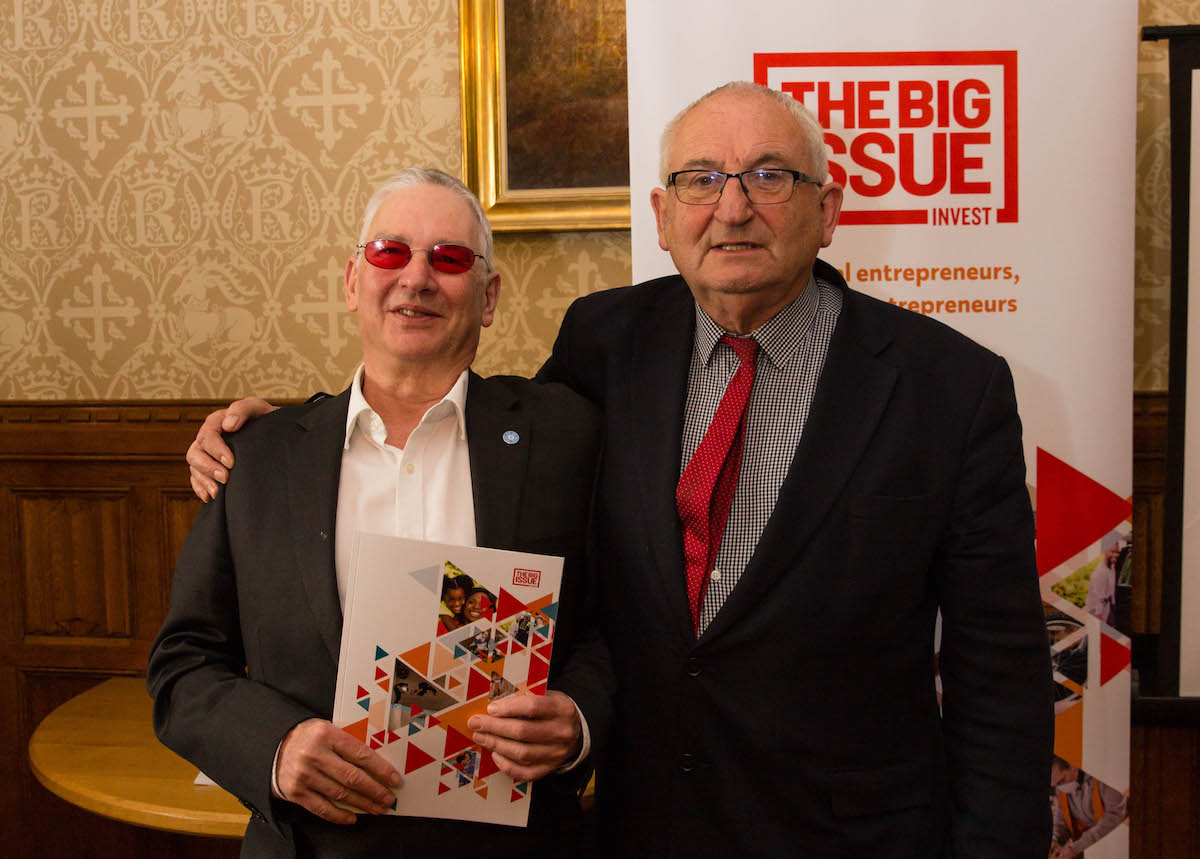What Big Issue Invest does
Over time, Big Issue Invest has moved beyond loans. It runs programmes that link social businesses with corporate mentors, manages millions of pounds worth of investment funds, and advises other investment funds too.
The money it invests is distinct from The Big Issue magazine. “None of the investment capital for Big Issue Invest comes from the sale of the magazine,” Kershaw explains.
Investors put money into the Big Issue Invest funds, and that money is then used to finance social businesses and charities. Investors get a financial return, just as they would with a regular investment.
One of the big challenges that Big Issue Invest faces is convincing people that it isn’t a charity but a finance venture. For Kershaw, it’s about looking at capitalism differently, and thinking about how investment can do good things to prevent and dismantle poverty.
Big Issue Invest has invested in a wide range of organisations and social businesses across the UK, including Hey Girls, which helps women and girls who can’t afford period products. It received a £50,000 investment and mentorship from Big Issue Invest’s Power Up Scotland programme, which has helped it to grow and to purchase stock. Hey Girls sells sanitary towels on a ‘buy one, give one’ model, meaning for every pack purchased another is donated to a woman in need.
Advertising helps fund Big Issue’s mission to end poverty
Investment from Big Issue Invest has allowed Employability Trust, a Country Durham organisation that helps young people find sustainable work by giving them work experience in the manufacturing and production industry, to expand and land contracts with big-name brands such as Nando’s, Pizza Express, B&Q and Nissan. Employability Trust operates a 15,000 square foot factory and has commercial contracts, supplying a range of services from storage to furniture restoration.
But Big Issue Invest has also worked hard to ensure a varied pool of potential investors
Big Issue Invest has also backed HCT, a social enterprise that makes money by providing public bus services and then reinvests into community transport services and skills training programmes. Another of the social enterprises it has supported is Digital Mums, which teaches mums social media skills and pairs them with local SMEs, social enterprises and charities who can’t afford full-time social media managers.
Its investments are varied. But Big Issue Invest has also worked hard to ensure a varied pool of potential investors, after a comment from an audience member at a City event some years ago made Kershaw stop and think.
“We were launching a fund in 2010 and I was challenged on why couldn’t the ordinary person, The Big Issue reader for example, invest in our fund, as it was restricted to qualified and sophisticated investors,” Kershaw recalls. “The person asking the question was dead right.”
At that point, Big Issue Invest’s investors were mainly corporates, trusts and very wealthy individuals. In the years since, Big Issue Invest has partnered with investment companies to launch a number of retail funds, geared towards ordinary people wanting to save for their pension or invest in an Isa rather than corporates and the wealthy investors.
“Social investment is not confined to those who have already made their money. It’s not just for high net worth individuals and large investors,” Kershaw says.
Advertising helps fund Big Issue’s mission to end poverty
Working with partners from the finance world, Big Issue Invest has launched a number of funds for ordinary investors. For example, its UK equity impact employment opportunities fund invests in companies which promote
and implement good employment opportunities and practices. And, its UK social bond fund invests in things like affordable housing, education, health and social care.
Kershaw believes that impact investing is “impacting the mainstream”. “We are democratising the mainstream, we are diversifying the mainstream, we are changing the mainstream,” he says.
The future
While larger investors can certainly provide scale, and can help social enterprises to grow, the future of impact investing – investing for a social purpose, not just a profit –
lies in bringing it to a wider audience, says Kershaw. An audience that perhaps feels alienated by the worlds of finance and politics, as evidenced by election results in recent years, he says.
He talks about the idea of “democratising capital”, by giving ordinary people a choice in how they invest, how they save and where their pension goes. “And doing it in a way that gives them a financial return but also benefits their families, their communities and the wider UK,” he says. “And helps create a more fair, inclusive and geographically balanced economy.”
And, thanks to advances in technology, Kershaw believes that, in the future, it will be possible to bring impact investing to more people through low-cost online platforms.
Already, there are millions of ordinary people across the UK who save money or put money into a pension or Isa. “But most of them aren’t really being offered a way to invest in things with social and environmental impact,” Kershaw says.
Advertising helps fund Big Issue’s mission to end poverty
“Wouldn’t it be great if there was somewhere that you could safely put your savings or your pension, somewhere where it would work for you and also do something good,” he says. “For example, it would be incredible if you could put your pension into something that would create some social value but still maintain financial security for you, for your future.”
“For a lot of people there’s this sense of alienation around investments and finance,” he says. “But if you could see where your money was going, and what it was doing and that it wasn’t just flowing into some anonymous City firm, wouldn’t that be nice?”
According to Kershaw, Big Issue Invest wants to make investments “tangible” for ordinary people and help them “realise that you can do good things with finance”. “We want to make it about more than numbers and graphs and percentages,” he says.









